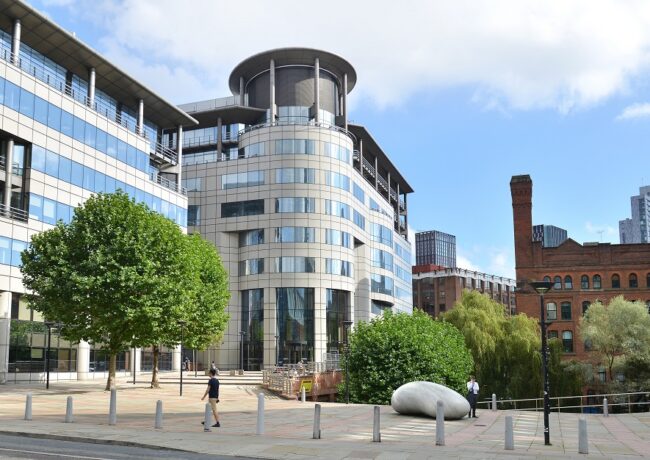WeWork looks to corporates as focus sharpens in Manchester
The co-working company is doubling down on efforts to cement its presence in the North West by targeting what it terms “enterprise” occupiers, those with more than 500 employees, for future growth.
Following a strategic review of its Manchester leaseholdings by property consultancy Knight Frank last year, WeWork has appointed Colliers International to help it better position itself as an alternative to traditional real estate.
Colliers is to market WeWork’s existing workspaces, which aim to provide tenants with flexible offerings ranging from standalone private offices to custom builds.
In particular, Colliers has been tasked with supporting WeWork’s sales team in building its pipeline of transactions with larger, enterprise occupiers and making necessary tweaks to its offering to better sell its spaces to these sorts of clients.
“As the value of flexible workspace continues to grow, more and more companies are repurposing the office as a place to foster creativity, collaboration and culture,” said Luke Armstrong, head of international broker and agent development at WeWork.
“By partnering with Colliers in Manchester, we can further meet this growing demand, particularly from enterprise companies that are swapping traditional real estate commitments for more flexible workspace solutions.”
Colliers has been contacted for comment.
The first indication of WeWork’s move to diversify its offering in Manchester beyond its traditional provision of space for start-ups, sole traders and SMEs was its deal with Deloitte last year. The Big Four advisory firm agreed to relocate from its 67,000 sq ft Hardman Street base in Spinningfields to 35,000 sq ft at WeWork’s Hanover Building on Corporation Street, as it seeks a more flexible approach to working in the wake of the pandemic.
Under the deal, Deloitte’s 800 Manchester-based staff will occupy two floors at the grade two-listed, 91,000 sq ft Hanover Building in the emerging Noma business district. WeWork currently operates the entirely of the Hanover property.
The US-headquartered shared offices company has been gradually diversifying its focus for some time, and enterprise firms now account for more than 50% of its members globally.

Deloitte is moving to the Hanover Building
What is more, the average length of commitments to WeWork space among global members has risen from one month in 2015 to 15 months in 2020 and again to 27 months by the first quarter of this year, largely driven by an increase in enterprise agreements.
Holiday bookings firm Awaze is another example of a Manchester-based corporate swallowing up a sizeable amount of WeWork space.
Last month, it expanded its membership of WeWork’s Dalton Place workspace – a deal struck last October – to enable it to double its workforce from the circa-100 people currently accommodated at the property.
Awaze said it has recruited 50 new staff in the past three months since moving into Dalton Place in January and intends to accelerate its expansion plans further based on the continued success of its Hoseasons, Cottages.com and Landal GreenParks UK holiday portals.
Manchester city centre accounts for all of WeWork’s leaseholdings in the North West. These are:
- 1 St Peter’s Square – 40,000 sq ft
- The Hanover Building – 91,000 sq ft
- Dalton Place on John Dalton Street – 65,000 sq ft
- No1 Spinningfields – 60,000 sq ft
As part of the Knight Frank-led review, the company pulled out of a deal to lease 50,000 sq ft at Boultbee Brooks’ Hyphen office building on Mosley Street, preferring to focus instead on optimising existing space in the city.
WeWork has struggled financially over the past two years and instigated a global cost-cutting and “rightsizing” strategy after reporting $1.25bn of losses in the third quarter of 2019. Its founder Adam Neumann resigned as chief executive in September that year, shortly before the company pulled the plug on plans to sell its shares on the stock market. It is now planning to merge with blank-check firm Spac in a $9bn deal awaiting US regulatory approvals.
Global losses quadrupled to more than £2.1bn as of the first quarter of 2021, WeWork reported in May, as the company lost members as a result of the Covid-19 pandemic and associated lockdowns and work-from-home directives.
Still, it reports greater demand for its spaces and service offering as the boundaries between flexible and traditional office space become increasingly blurred in the wake of the pandemic. The company offers a diverse range of memberships and types of workspaces to tap into such market shifts.
Among these are standalone private offices, custom build-outs, all-access passes to multiple WeWork locations, and a forthcoming ‘On Demand’ product, which will provide users with pay-as-you-go access to convenient workspace in 70 buildings across the UK, and allow non-members to digitally book meeting rooms, conference rooms or a dedicated desk on a more casual basis.
This service has launched in the US and will be rolled out in the UK in the coming months.
It is understood that WeWork has seen solid performance in its Manchester portfolio despite a slight dip in membership last year due to Covid. The recent Deloitte and Awaze lettings point to a return to pre-pandemic levels of interest in its space, it says.




